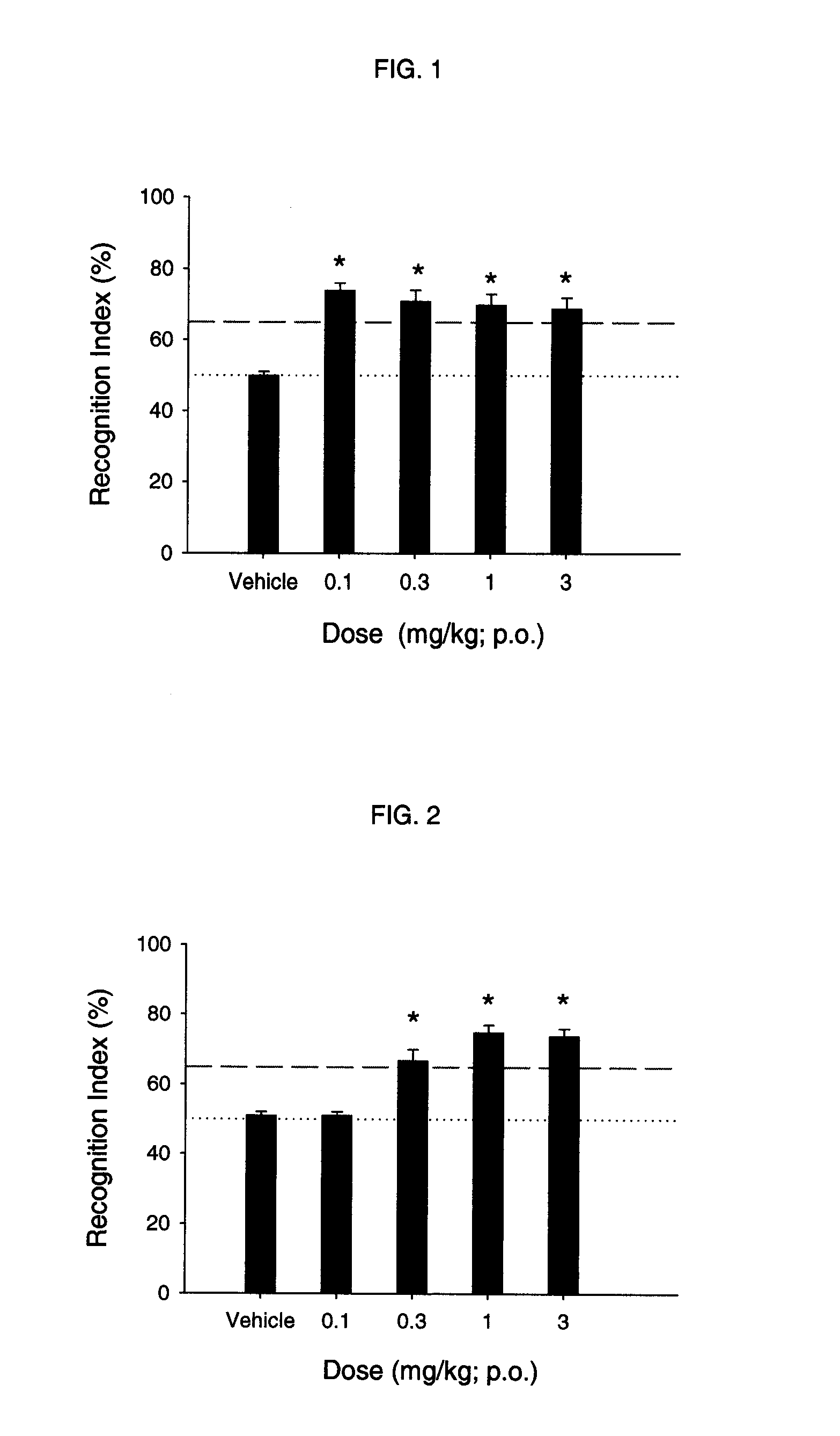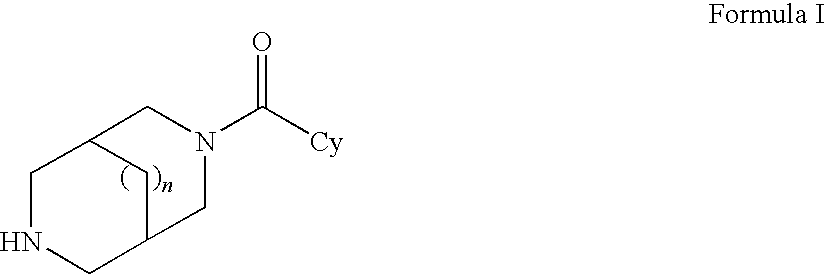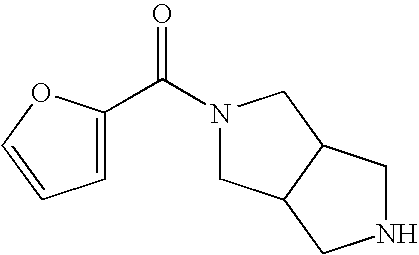Sub-type selective amides of diazabicycloalkanes
a diazabicycloalkane and selective amide technology, applied in the field of sub-type selective amides of diazabicycloalkanes, can solve the problems of nicotinic compounds and associated with various undesirable side effects, and achieve the effects of reducing the number of nicotinic cholinergic receptors in the brain of patients, preventing and suppressing symptoms, and increasing blood pressure and heart ra
- Summary
- Abstract
- Description
- Claims
- Application Information
AI Technical Summary
Benefits of technology
Problems solved by technology
Method used
Image
Examples
example 1
Radioligand Binding at CNS nAChRs
[0071]α4β2 nAChR Subtype
[0072]Preparation of Membranes from Rat Cortex: Rats (Female, Sprague-Dawley), weighing 150-250 g, were maintained on a 12 h light / dark cycle and were allowed free access to water and food supplied by PMI Nutrition International, Inc. Animals were anesthetized with 70% CO2, and then decapitated. Brains were removed and placed on an ice-cold platform. The cerebral cortex was removed and placed in 20 volumes (weight:volume) of ice-cold preparative buffer (137 mM NaCl, 10.7 mM KCl, 5.8 mM KH2PO4, 8 mM Na2HPO4, 20 mM HEPES (free acid), 5 mM iodoacetamide, 1.6 mM EDTA, pH 7.4); PMSF, dissolved in methanol to a final concentration of 100 μM, was added and the suspension was homogenized by Polytron. The homogenate was centrifuged at 18,000×g for 20 min at 4° C. and the resulting pellet was re-suspended in 20 volumes of ice-cold water. After 60 min incubation on ice, a new pellet was collected by centrifugation at 18,000×g for 20 min ...
example 2
Determination of Dopamine Release
[0081]Dopamine release was measured using striatal synaptosomes obtained from rat brain, according to the procedures set forth by Rapier et al., J. Neurochem. 54: 937 (1990). Rats (female, Sprague-Dawley), weighing 150-250 g, were maintained on a 12 h light / dark cycle and were allowed free access to water and food supplied by PMI Nutrition International, Inc. Animals were anesthetized with 70% CO2, then decapitated. The brains were quickly removed and the striata dissected. Striatal tissue from each of 2 rats was pooled and homogenized in ice-cold 0.32 M sucrose (5 mL) containing 5 mM HEPES, pH 7.4, using a glass / glass homogenizer. The tissue was then centrifuged at 1,000×g for 10 min. The pellet was discarded and the supernatant was centrifuged at 12,000×g for 20 min. The resulting pellet was re-suspended in perfusion buffer containing monoamine oxidase inhibitors (128 mM NaCl, 1.2 mM KH2PO4, 2.4 mM KCl, 3.2 mM CaCl2, 1.2 mM MgSO4, 25 mM HEPES, 1 mM...
example 3
Selectivity vs. Peripheral nAChRs
[0084]Interaction at the Human Muscle nAChR Subtype
[0085]Activation of muscle-type nAChRs was established on the human clonal line TE671 / RD, which is derived from an embryonal rhabdomyosarcoma (Stratton et al., Carcinogen 10: 899 (1989)). These cells express receptors that have pharmacological (Lukas, J. Pharmacol. Exp. Ther. 251: 175 (1989)), electrophysiological (Oswald et al., Neurosci. Lett. 96: 207 (1989)), and molecular biological profiles (Luther et al., J. Neurosci. 9: 1082 (1989)) similar to the muscle-type nAChR.
[0086]TE671 / RD cells were maintained in proliferative growth phase according to routine protocols (Bencherif et al., Mol. Cell. Neurosci. 2: 52 (1991) and Bencherif et al., J. Pharmacol. Exp. Ther. 257: 946 (1991)). Cells were cultured in Dulbecco's modified Eagle's medium (Gibco / BRL) with 10% horse serum (Gibco / BRL), 5% fetal bovine serum (HyClone, Logan Utah), 1 mM sodium pyruvate, 4 mM L-Glutamine, and 50,000 units penicillin-str...
PUM
| Property | Measurement | Unit |
|---|---|---|
| pH | aaaaa | aaaaa |
| compositions | aaaaa | aaaaa |
| affinity | aaaaa | aaaaa |
Abstract
Description
Claims
Application Information
 Login to View More
Login to View More - R&D
- Intellectual Property
- Life Sciences
- Materials
- Tech Scout
- Unparalleled Data Quality
- Higher Quality Content
- 60% Fewer Hallucinations
Browse by: Latest US Patents, China's latest patents, Technical Efficacy Thesaurus, Application Domain, Technology Topic, Popular Technical Reports.
© 2025 PatSnap. All rights reserved.Legal|Privacy policy|Modern Slavery Act Transparency Statement|Sitemap|About US| Contact US: help@patsnap.com



